Telehealth Newsletter
Official Newsletter of Telemedicine Society of India

What is New?
February was relatively quiet in terms of events, with the notable exception of the 11th edition of Transforming Healthcare with IT, held in Bangalore. The new office bearers of TSI (Telemedicine Society of India), have been meeting virtually every month, led by Dr. Kim, to improve processes and systems, which are expected to be implemented soon.
Thank You
Dr. Sunil Shroff
Chief Editor
Vice President, TSI
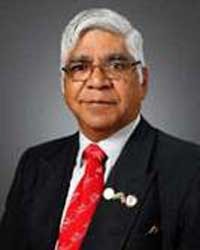
A Conference with a Difference!
Dr. K. Ganapathy
Chairman, Scientific Committee THIT 2024 | Distinguished Visiting Professor IIT Kanpur | Distinguished Professor The Tamilnadu Dr MGR Medical University | Emeritus Professor National Academy of Medical Sciences | Adjunct Professor, SIPA Columbia University | Director Apollo Telemedicine Networking Foundation &, Apollo Tele Health Services
Just as a calf likes to suckle, so too does the cow like to be suckled !! The greatest incentive for conference organisers to persist in their efforts, is the attendance and the feedback. 13 years ago when Dr Sangita Reddy mooted the idea of a conference on “ Transforming Healthcare with IT” we realised that we were too far ahead of the time. A conference on a then non existing subject required considerable conviction ! 200 hundred years ago Victor Hugo had remarked “ Nothing can stop an idea whose time has come”. THIT 2024 has proved that. Last week we reached that critical mass essential for a successful take off. 1667 registrants – young and old, converted and to be converted had an opportunity to directly listen to 67 speakers https://www.transformhealth-it.org/wp-content/uploads/2021/05/11thTHIT-2024_-Agenda.pdf (combined experience of more than 1600 years !!) from 8 different countries.
Cutting Edge topics discussed included Climate change &Telehealth, panel discussions on Bench to Bedside, Healthcare in Outer space, Digital Personal Data Protection Bill, AI deployment, changing trends in technology, Innovations in Digital health etc. It was wonderful to see national and global authorities adhere to the 720 seconds given to them – after all when you have mastered your subject you can communicate the essence as a Take Home Message. Time management was incredible. More than 1000 virtual attendees logged in to partake in 20 hours of unadulterated wisdom. We deliberately had no parallel sessions. Opportunity to display ePosters was also available.
Visits to 31 stalls enabled the attendees to see, touch, feel and understand that what appeared like science fiction, was indeed a cost effective customised available reality ! In keeping with the times everything was App based including a Quiz program and Treasure Hunt . Of course a QR code was essential for plates for lunch !. Large number of contestants for the 8 awards and for the 36 hour Solvathon marathon held in conjunction with IITACB indicates that THIT has truly arrived. This would not have been possible but for a fantabulous set of volunteers who did not want to follow high standards. They believed in setting them ! We no longer strive to achieve world class. We want the world to strive to achieve India class !! A big thank you again to the core committee of Dr Sangita Reddy, Vikram Thaploo. Dr Sujoy kar, Dr Sai Praveen Haranath, Ashokkan and Aashish Kumar Jain.

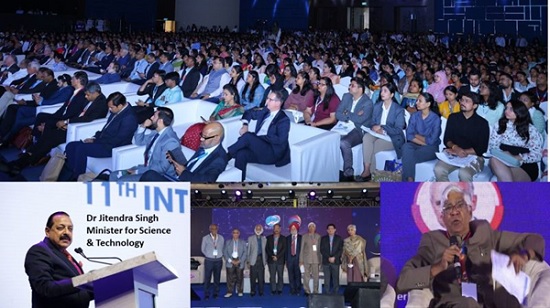
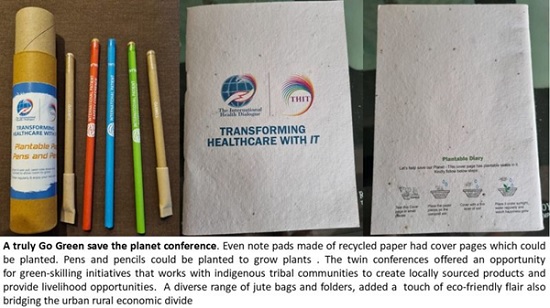
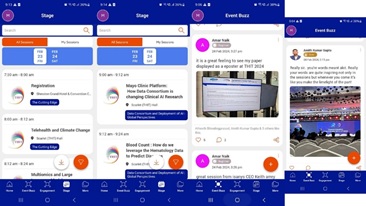
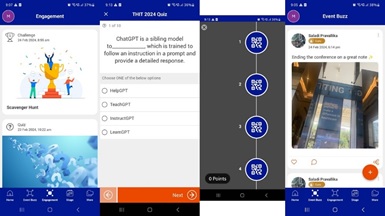
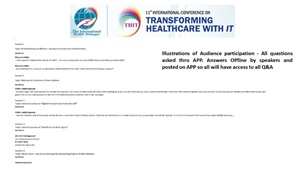
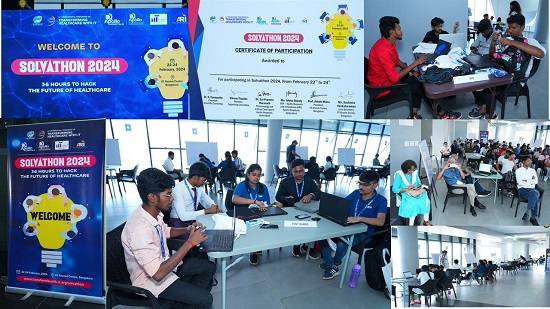
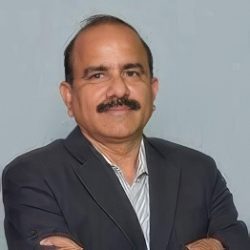
TSI‘s participation in Australian Delegation of Doctors on Study tour to India
Dr. Murthy Remilla
Member and Hon Sec from 2019 -2023 – Telemedicine Society of India(TSI)
Australian Doctors Business Academy (ADBA) is an Evidence-based best practice educational platform designed for doctors and their needs at the centre. ADBA utilises a unique delivery model to cover critical topics not routinely canvassed in medical education curriculum.
ADBA under the leadership of Dr. Sayanta Jana has recently organised “The International, Digital Healthcare Study Tour” at Chennai, India during Jan3-6,2024. The Australian delegation of Doctors included eminent medical specialists from a range of specialties from all over Australia. This included senior medical executives, Medical administrators, general practitioners, paediatricians, ophthalmologists, Intensive care specialists, and others. The group also had a representation from several founders and CEOs of various Australian MedTech and digital healthcare startup companies.
The study tour attracted the attention of major tech giants such as Google, Microsoft, Amazon AWS, whose representatives from India, Melbourne and California presented their latest developments in terms of Generative AI, latest advances in medical tech and digital healthcare. Australian major startups like ConsultMed and HolaHealth showcased their tech innovations in the clinical space. There were very valuable presentations provided by Apollo Telehealth, Telemedicine Society of India, Sankara Nethralaya and IIT Madras, that made the study tour content very spectacular. Dr Murthy Remilla from Bangalore and Dr. Sheila John from Chennai are the two important delegates and speakers from Telemedicine Society of India (TSI) in the Conference dwelling on the aspects of Government initiatives in the file of Telemedicine & Digital Helath and Telemedicine for opthalmology, respectively.
ADBA has a high profile academic faculty team that supports our ADBA curriculum, workshops and courses built on years of expertise from hundreds of course facilitators and real life experiences of our course participants. ADBA provides participants with recipes for success that are not usually part of medical education curriculum.
ADBA curriculum and courses are contemporary and evolve every year in an ever-changing environment to keep the alumni engaged. We take you back to the foundations of education and learning in relaxed settings that are in sync with your profession, lifestyle and social needs.
The Study Tour was based at Taj Coromandel, Chennai and had an intensive 3 days program.
Delegates of this Study Tour were able to achieve a few key learning objectives as below.
Identify potential benefits and risks of the use of generative AI technology in the context of the current Australian healthcare system including primary care medicine.
Describe what mixed reality technology is and how it can be applied to enhancing management of patients and medical education provision.
Describe how AI technology has been used in models of care in some key clinical specialties for diagnosis of disease and in the identification of underlying causes and how these learnings can be extrapolated to all other clinical disciplines.
Outline suitable scenarios where the use of medical wearable technology can be applied for optimising data collection and patient care.
Demonstrate pathways for development of innovative technologies in the area of medical care, from diagnosis to management.
The concept of the study tour format is a close-knot group learning format over various presentations, for a limited group of eager participants, designed to elicit new ideas (using the digital healthcare theme) to ensure delegates can take away suitable lessons learnt to their individual professional practices – be it as a clinical practitioner one may take away new ideas to their clinical specialty or as a commercial/digital tech lead and innovator, one may have a bright business idea that needs a push – and this network over the few days gave such a platform for that. In this small group a mix of clinicians, tech experts, investors and serious tech innovators are all very helpful for the delegates as future mentors and key contacts when one becomes an alumni of ADBA.
The study tour began with a cultural immersion for Australian delegates organised by Dr. Murthy Remilla from Tsi, Bangalore; a short concert by Dr Charulata Mani. Dr Mani is an acclaimed Indian Classical Singer and completed her PhD and Post Doc from University of Queensland (currently also visiting professor at UQ) and now settled in US. She is currently touring India and coincidentally currently in Chennai. More than a classical singer, she is an ethnomusicologist. The beauty is in her Youtube programme series called “Isai Payanam”. She explains the notations and special singing styles performed by different artists in that raga and also what are all the songs set to that tune and how and which movie songs are based on that tune and how it was used in Hindustani music etc.; thus takes along the audience instead of going on singing in her own way!
The second day was concluded by a very interesting Apollo Hospital tour where Apollo digital tech executives and medical directors showcased their technology innovations that impressed the group quite a bit even when compared to the Australian landscape. Various surgeons from orthopaedics, upper GI, Urology and Colorectal, showcased their robotic surgery capabilities and achievements, the sheer volume of robotic surgery being very impressive.
At a formal dinner at ITC Grand Chola, TN IT Minister PTR as well as Western Australian MLA Dr Jags Krishnan, spoke at length about their own leadership journey as leaders, entrepreneurs, and provided insights to the audience in terms of their own experiences and lessons learnt in a very candid session that really warmed up the delegation.
The delegates finished off the study tour by a very delightful tour of Mahabalipuram followed by a sumptuous dinner at ITC NammaShack.
It is expected that Australian Doctors Business Academy (ADBA) will return to India again for another study tour possibly 2025-2026.
Please follow Australian Doctors Business Academy on LinkedIn and Facebook. To join mailing lists, please visit https://doctorsbusinessacademy.com.au
Inquiries can be made at info@doctorsbusinessacademy.com.au
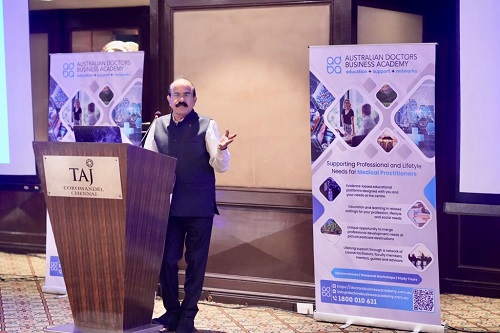

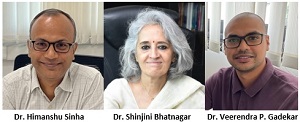
IIT Madras & THSTI Faridabad Researchers develop the first India-specific AI model to determine the age of the foetus
Dr. Himanshu Sinha
Associate Professor, Dept of Biotechnology, IIT Madras
Dr. Shinjini Bhatnagar
Principal Investigator of GARBH-Ini & Distinguished Professor at THSTI
Dr. Veerendra P. Gadekar
Senior Project Scientist, Dept of Biotechnology, IIT Madras
Called ‘Garbhini-GA2,’ this AI Model accurately estimates the age of a foetus in a pregnant woman in the second and third trimesters for the Indian population, reducing error by almost three times
CHENNAI, 26th February 2024: Researchers at Indian Institute of Technology Madras (IIT Madras) and Translational Health Science and Technology Institute (THSTI), Faridabad, as part of ‘Interdisciplinary Group for Advanced Research on Birth Outcomes – DBT India Initiative’ (GARBH-Ini) program, have developed the first India-specific Artificial Intelligence (AI) model to determine the age of a foetus in a pregnant woman in the second and third trimesters precisely.
Accurate ‘Gestational Age’ (GA) is necessary for the appropriate care of pregnant women and for determining precise delivery dates. Called ‘Garbhini-GA2’, this is the first late-trimester GA estimation model to be developed and validated using Indian population data.
The most important benefits of this GA model include
Currently, the age of a foetus (‘Gestational Age’ or GA) is determined using a formula developed for Western population
They are likely to be erroneous when applied in the later part of pregnancy due to variations in the growth of the foetus in the Indian population
The newly developed ‘Garbhini-GA2’ accurately estimates the age of a foetus for the Indian population, reducing error by almost three times.
This GA model can improve the care delivered by obstetricians and neonatologists, thus reducing maternal and infant mortality rates in India.
Welcoming this research, Dr. Rajesh Gokhale, Secretary, Department of Biotechnology (DBT), Government of India, said, “GARBH-Ini is a flagship programme of DBT, and the development of these population-specific models for estimating gestational age is a commendable outcome. These models are being validated across the country.”
This research was undertaken by Dr. Himanshu Sinha, Associate Professor, Bhupat and Jyoti Mehta School of Biosciences, Department of Biotechnology, IIT Madras, Dr. Shinjini Bhatnagar, the Principal Investigator of GARBH-Ini programme and a distinguished professor at Translational Health Science and Technology Institute (THSTI), and other researchers. The findings were published in the prestigious international peer-reviewed journal Lancet Regional Health Southeast Asia (DOI: 10.1016/j.lansea.2024.100362)
The BRIC-THSTI is an institute under the Biotechnology Research and Innovation Council (BRIC), Department of Biotechnology, Ministry of Science and Technology, Government of India. The institute acts as a catalyst to translate fundamental discoveries by building rigorous clinical research capacity and enabling faster transition of discoveries from bench to bedside.
Highlighting the importance of this study, Dr Himanshu Sinha, who is also a Coordinator at the Center for Integrative Biology and Systems Medicine, IIT Madras, and who led the data science work for this research, said, “IIT Madras has been contributing towards solving healthcare problems at the grassroots and local level with the aim of enhancing public health in India. To this end, working with our clinical partner, THSTI, we are utilising advanced data science and AI/ML techniques to build tools to predict unfavourable birth outcomes. The first step towards this is to develop accurate GA models that perform significantly better than currently used models designed using Western populations.”
Elaborating further, Dr Shinjini Bhatnagar, Principal Investigator of the GARBH-Ini programme and a Distinguished Professor, Translational Health Science and Technology Institute (THSTI), said, “Improving the GA accuracy is a critical component of the broader goals of the GARBH-Ini study, which aims to reduce the adverse pregnancy outcomes. The mere application of sophisticated data science tools is not sufficient. The crux of ensuring that these technological advancements yield tangible benefits in the clinical realm lies in the end-to-end partnership between clinicians and data scientists. Such collaboration ensures that the development of solutions is not only technically sound but also clinically relevant and seamlessly integrated into healthcare workflows. This study is an exemplar of this approach.”
Ultrasound dating in early pregnancy is the standard of care for determining GA. However, dating based on formulae developed with Western data, particularly in the second and third trimesters, tends to be less accurate in the Indian population due to the variations in foetal growth.
The researchers used genetic algorithm-based methods to develop Garbhini-GA2, which, when applied in the second and third trimesters of pregnancy, was more accurate than the current Hadlock and recent INTERGROWTH-21st models. The Garbhini-GA2 model, compared to Hadlock, reduces the GA estimation median error by more than three times.
Garbhini-GA2 used three routinely measured foetal ultrasound parameters, was developed using GARBH-Ini cohort data documented at Gurugram Civil Hospital, Haryana, and was validated in an independent cohort in South India. Application of Indian population-specific GA formulae with better accuracy can potentially improve pregnancy care, leading to better outcomes. This accurate dating will also enhance the precision of epidemiological estimates for pregnancy outcomes in the country.
Once validated in prospective pan-India cohorts, this Garbhini-GA2 can be deployed in clinics across India, improving the care delivered by obstetricians and neonatologists, thus reducing maternal and infant mortality rates in India.
This study was conducted in partnership with Gurugram Civil Hospital, Gurugram, Safdarjung Hospital, New Delhi, Christian Medical College Vellore, and Pondicherry Institute of Medical Sciences, Puducherry. The GARBH-Ini program is a flagship programme of the Department of Biotechnology (DBT), Govt of India. The GA model-building research was funded by the Grand Challenges India program of the Biotechnology Industry Research Assistance Council, DBT, Government of India.
Additional funding came from the Robert Bosch Centre for Data Science and Artificial Intelligence (RBCDSAI), IIT Madras and the Centre for Integrative Biology and Systems Medicine (IBSE), IIT Madras.
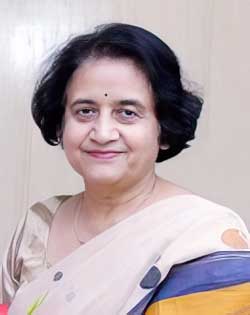
Telemedicine: Future of Health Care
Prof. Meenu Singh
Executive Director & CEO, AIIMS Rishikesh | President, TSI-UK Chapter | Past President Telemedicine Society of India
On behalf of the entire team behind the recent webinars on “Heart Failure Management” and “Sleep Disorders and Accidents,” I want to express our sincere gratitude for the active participation and engagement of eminent faculties and students. Everyone’s presence and contributions made the webinar a resounding success, fostering a vibrant exchange of knowledge and insights on these critical topics. I would specially like to thank Telemedicine Society of India to give us platform and opportunity so that Uttarakhand chapter organize such webinars.
The realm of telemedicine is constantly evolving, offering innovative ways to bridge the gap between knowledge and action. The recent webinars focusing on heart failure and obstructive sleep apnoea (OSA) exemplifies this power, empowering patients on multiple fronts through the convenience and accessibility of telemedicine.
Firstly, the webinar served as an educational platform, accessible from the comfort of participants’ homes. By delving into the complexities of both conditions, participants gained a deeper understanding of disease symptoms, risk factors, and potential interactions. This newfound knowledge equips them to proactively engage in their health, allowing them to recognize potential red flags and initiate conversations with their patients through telemedicine consultations.
With so many attendees, the webinars saw an impressive turnout, reflecting the growing interest in understanding the complex interplay between sleep disorders and accidents. The active participation throughout the session was truly commendable. From insightful questions posed in the live chats to lively discussions between different departments, a deep commitment to learning and sharing valuable perspectives was truly evident.
The success of this webinar transcended the mere dissemination of information. It became a platform for connection, collaboration, and most importantly, hope. We witnessed a collective commitment to improving the lives of individuals struggling with these challenging conditions, and that spirit of unity is truly inspiring.
It was clearly evident how every speaker had carefully curated their vast knowledge of these important topics into engaging presentations without missing out on the recent advances in order to keep us updated with the changing era.
The success of the webinar can be attributed to several factors, and everyone’s active participation stands out as a cornerstone. Here are just a few ways everyone’s contributions enriched the experience:
Engaging Questions: The insightful questions during the live chat discussions, challenged the speakers, prompting deeper exploration of key concepts and practical applications of heart failure, sleep disorders and their management. This intellectual curiosity not only benefited the individual asking the question but also broadened the understanding of the entire audience.
Vibrant Discussions: The chat forum buzzed with lively discussions throughout the session. Everyone actively shared their experiences, insights, and questions, creating a dynamic platform for peer-to-peer learning and knowledge exchange. This collaborative spirit fostered a sense of community and enriched the overall learning experience.
Dissemination of Knowledge: By actively participating in the webinar, we have become ambassadors for raising awareness about the link between heart failure and sleep disorders. Sharing our learnings within our professional circles and personal networks can have a significant impact on improving heart health and sleep quality for many individuals.
We understand that time is valuable and everyone’s active participation has not only contributed to the success of these webinars but also has paved the way for future advancements in heart failure management and sleep medicine.
We encourage everyone to stay connected and continue the dialogue. We are committed to providing, valuable resources and opportunities for further learning.
As we move forward, we carry with us the invaluable insights gleaned from these webinars. I thank everyone once again for their invaluable participation. We look forward to engaging with everyone in future endeavors aimed at improving our understanding of important topics and updating our existing knowledge with the recent advances and developments in order to provide, state of art care to our population.
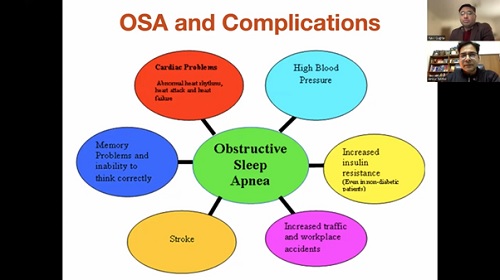
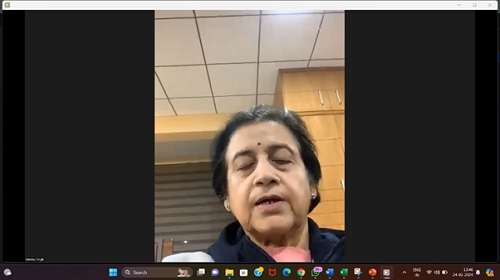
Telemedicine – News from India & Abroad
AI Tool Moderately Effective in Predicting Kidney Injury
Hospital-acquired acute kidney injury (HA-AKI) poses risks like chronic kidney disease, longer hospital stays…Readmore
Apple’s Vision Pro Launch: Surge in Adoption for Surgical AR/VR
The imminent adoption of surgical augmented reality and virtual reality (AR/VR) is expected to be greatly influenced by Apple’s recent… Readmore
AI-Based Stroke Care Reduces Recurrence & Deaths
Stroke survivors who received care recommendations from artificial intelligence (AI)-based system experienced fewer recurrent strokes, heart attacks…..Reademore
Novel Machine Learning Directs to Precise Heart Attack Drugs
An innovative machine learning approach- a subset of artificial intelligence, in combination with culminated human knowledge, can identify drugs…..Readmore
TSI invites all the TSI Chapters and Members to submit information on their upcoming Webinar or Events (50 words), News related to Telemedicine (200 words) or short articles (500 words) for the monthly e-newsletter.Guidelines for submission to TSI Newsletter-
- Report can be from 500 to 600 words
- Report Should be relevant to Telemedicine or Medical Informatics
- No promotion of self or any product
- Avoid plagiarism
- All references should be included
- Provide any attributions
- Visuals are welcome including video links
- Send full authors name, degrees, affiliations along with a passport sized photograph of good resolution. If multiple authors only main author photo to be sent.
Submission may be sent to – tsigrouptn@gmail.com
Editors reserve the rights for accepting and publishing any submitted material.
Editor in Chief – Dr. Sunil Shroff
Editors – Dr. Senthil Tamilarasan & Dr. Sheila John
Technical Partner- https://www.medindia.net

